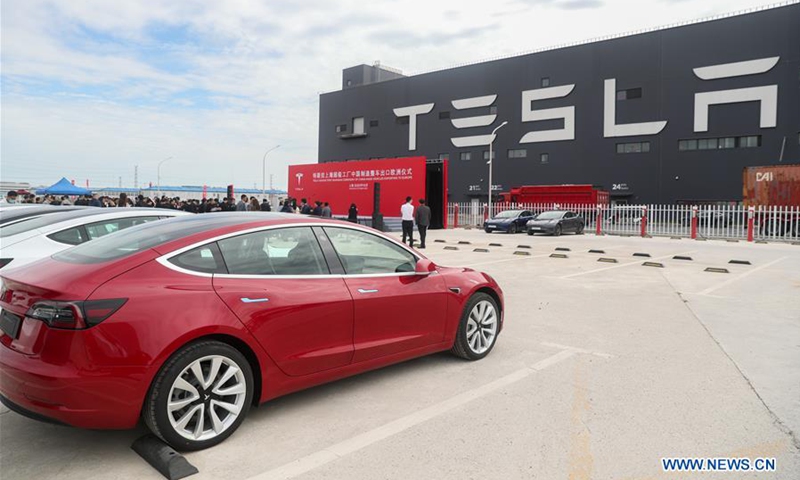
Photo taken on Oct. 26, 2020 shows the Tesla China-made Model 3 vehicles at its gigafactory in Shanghai, east China. Photo: Xinhua
Business representatives from both China and the US expect closer ties to jointly develop the auto industry that is directed at smart electric vehicles (EVs). They are calling for an open and fair business environment despite the ongoing tensions between the world's two largest economies.
Xu Haidong, assistant secretary general of the China Association of Automobile Manufacturers, said that Chinese and American auto companies have been successfully cooperating, and the two sides have leveraged their respective advantages to establish a win-win situation.
"Chinese companies want to invest in the US, to participate in its innovation activities and integrate into its economy. But this needs the US to provide a more stable, fair and transparent business environment," Xu noted.
He made the remarks during a China-US auto industry seminar held in Hangzhou, capital of East China's Zhejiang Province on Thursday. The event was the first in 2021 of the US-China Commercial Match-Making Program (CMP), which was jointly launched by the China Council for the Promotion of International Trade (CCPIT) and the US Commerce Department in 2005.
Xu noted that the US government should cancel punitive tariffs against China and restore confidence among Chinese investors.
"China also welcomes US firms to grow with domestic auto industry," he added.
US tech giant Tesla witnessed its sales in the Chinese market more than double last year amid the COVID-19 pandemic thanks to the rapid economic recovery in China under effective coronavirus prevention measures.
Ford Motor sold 602,627 vehicles in China last year, up 6 percent from 2019, its first annual growth in the world's biggest car market since 2017.
"As the participants, promoters and beneficiaries of economic and trade cooperation between China and the US, the business community is more than qualified to set the goals for a mutually beneficial and win-win nature of China-US economic and trade relations, as well as the extensive common interests and huge space for their cooperation," said Zhang Shenfeng, vice chairman of the CCPIT, during the seminar.
A slew of recent surveys by the US Chamber of Commerce, the US-China Business Council, and the American Chamber of Commerce in China all showed that foreign companies in China are optimistic about the prospects for China's economic development in the future and are willing to continue to take root in China and oppose the economic decoupling of the two countries.
"The EV sector in the US is still wide open. The EV supply and industry chains are not mature enough, and there is room for competitive domestic players to tap into the sector," Cui Dongshu, secretary general of the China Passenger Car Association, told the Global Times.
China's EV industry is currently leading the world in terms of the establishment of an industry system, improvement of technology levels and corporate competitiveness, and infrastructure construction, Cui noted.




